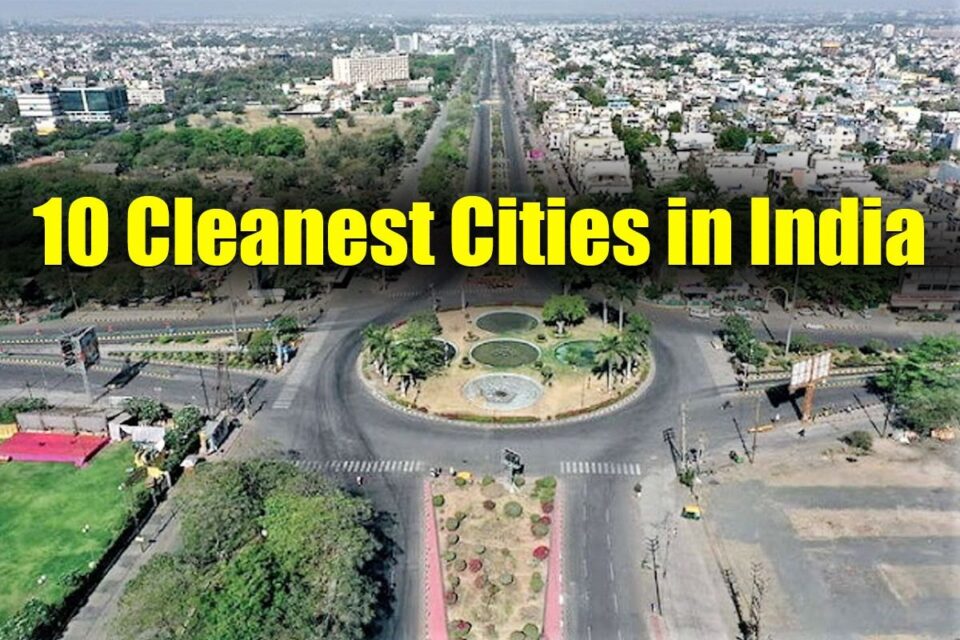India’s annual Swachh Survekshan survey by the Ministry of Housing & Urban Affairs ranks cities on cleanliness, waste management, sanitation, and citizen feedback. The newest 2024–25 edition features a new category Super Swachh League for consistent top-performers that has altered the previous rankings. Let’s dive into the top 10 cleanest cities of India based on that latest report.
Cleanest Cities in India
Discover the top 10 cleanest cities in India and what sets them apart in terms of hygiene, sanitation, and environmental sustainability.
Indore, Madhya Pradesh
Indore will continue its reign as India’s cleanest city for the eighth consecutive year having graduated into the Super Swachh League and thus did not appear in the standard ranking this year. Indore remains the role model of urban clean and sustainable waste management with 100% door-to-door waste collection, household segregation, bio-CNG plants, an AI-enabled monitoring system and citizen engagement.
Surat, Gujarat
Once again in the Super Swachh League, Surat came in second (again) after Indore. Surat continues to be is recognized for its effective waste disposal systems, air and water sanitation measures, and public awareness campaigns that create culture of cleanliness.
Navi Mumbai, Maharashtra
The new Super Swachh League, Navi Mumbai placed consistently in the first three positions. The future’s bright because of the smart waste bins, composting units, biogas plants and continued engagement from the community.
Ahmedabad, Gujarat
In terms of ranking, Ahmedabad is denying city status to the cleanliness of the Super League city category as it scored the highest cleanest big city in the category of cities having over‑10‑lakh population. Bhopal and Lucknow followed close behind.
Bhopal, Madhya Pradesh
Bhopal was ranked second in the country behind Ahmedabad. It excelled with top scores in door-to-door collection, waste processing, water-body cleanliness, and sanitation infrastructure. Bhopal also has a 7-star Garbage-Free City rating and ‘Water Plus’ status.
Lucknow, Uttar Pradesh
Lucknow, which landed third nationally (behind Ahmedabad and Bhopal), received a monumental 7‑Star Garbage‑Free certification — the first in the state. With it came big improvements to municipal waste processing and general sanitation.
Visakhapatnam (Vizag), Andhra Pradesh
Vizag ranked in the 4th position and has consistently ranked 4th with a focus on beach clean ups, plastic-free drives, Eco-Vizag sustainability and effective sanitation planning.
Vijayawada, Andhra Pradesh
Vijayawada, which is ranked 5th, improved its cleanlyness ranking through strict door‑to‑door garbage collection, waste‑to‑energy initiatives, and strong public participation in sanitation activities
New Delhi (NDMC area), Delhi
NDMC secured 7th place in the million-plus population category after having improved its overall performance through rigorous waste segregation, zero-waste events, and overall high marks in sanitation dimensions, including public toilets, market cleanliness, and dumpsite remediation.
Mysuru (Mysore), Karnataka
Mysore ranked 8th for its untarnished history of cleanliness consciousness, along with its rich cultural heritage and comprehensive waste-segregation for composting, along with its clean public spaces.
Top-Ranked Cities
|
City |
Population Group |
Key Strengths |
|
Indore |
Super Swachh League |
100% segregation, smart waste management |
|
Surat |
Super Swachh League |
Sanitation infrastructure, citizen awareness |
|
Navi Mumbai |
Super Swachh League |
Recycling, biogas, smart bins |
|
Ahmedabad |
Million+ Cities |
Comprehensive sanitation systems |
|
Bhopal |
Million+ Cities |
Door-to-door collection, Water Plus status |
|
Lucknow |
Million+ Cities |
Garbage-free certification, municipal improvement |
|
Visakhapatnam |
Million+ Cities |
Eco-programs, beach cleanliness, waste management |
|
Vijayawada |
Million+ Cities |
Zero‑waste initiatives, public campaigns |
|
New Delhi |
Million+ Cities |
Thorough cleanliness indicators |
|
Mysuru |
Million+ Cities |
Composting, historical city upkeep |
Practices Behind Clean Cities
-
100% door‑to‑door collection & household segregation: All top cities mandate source segregation and regular pickups.
-
Advanced waste treatment: Bio‑CNG and waste‑to‑energy plants support processing and sustainability.
-
Smart infrastructure: GPS-enabled bins, real-time dashboards, and grievance apps improve accountability.
-
Citizen engagement: Cleanliness drives, rewards, and awareness campaigns fuel community ownership.
-
Sanitation standards: Ratings like ‘7‑Star Garbage‑Free’ and ‘Water Plus’ reflect comprehensive success.
Why This Ranking Matters
Swachh Survekshan is the world’s largest urban cleanliness survey, assessing over 4,500 cities across India. Its methodology includes citizen feedback, direct observation, waste infrastructure, and public outreach. The new Super Swachh League rewards sustained excellence, encouraging cities to adopt sustainable models—which can be replicated elsewhere.
Conclusion
India’s top clean cities in 2025—led by Indore, Surat, Navi Mumbai, Ahmedabad, and Bhopal—demonstrate how smart planning, local leadership, and civic pride can transform urban environments. For policymakers or citizens, these cities offer scalable models in smart waste management, public hygiene systems, and continuous engagement strategies. Curious about how medium‑sized cities or states are stepping up? Want tips on Clean City models for smaller towns? Just let me know!

